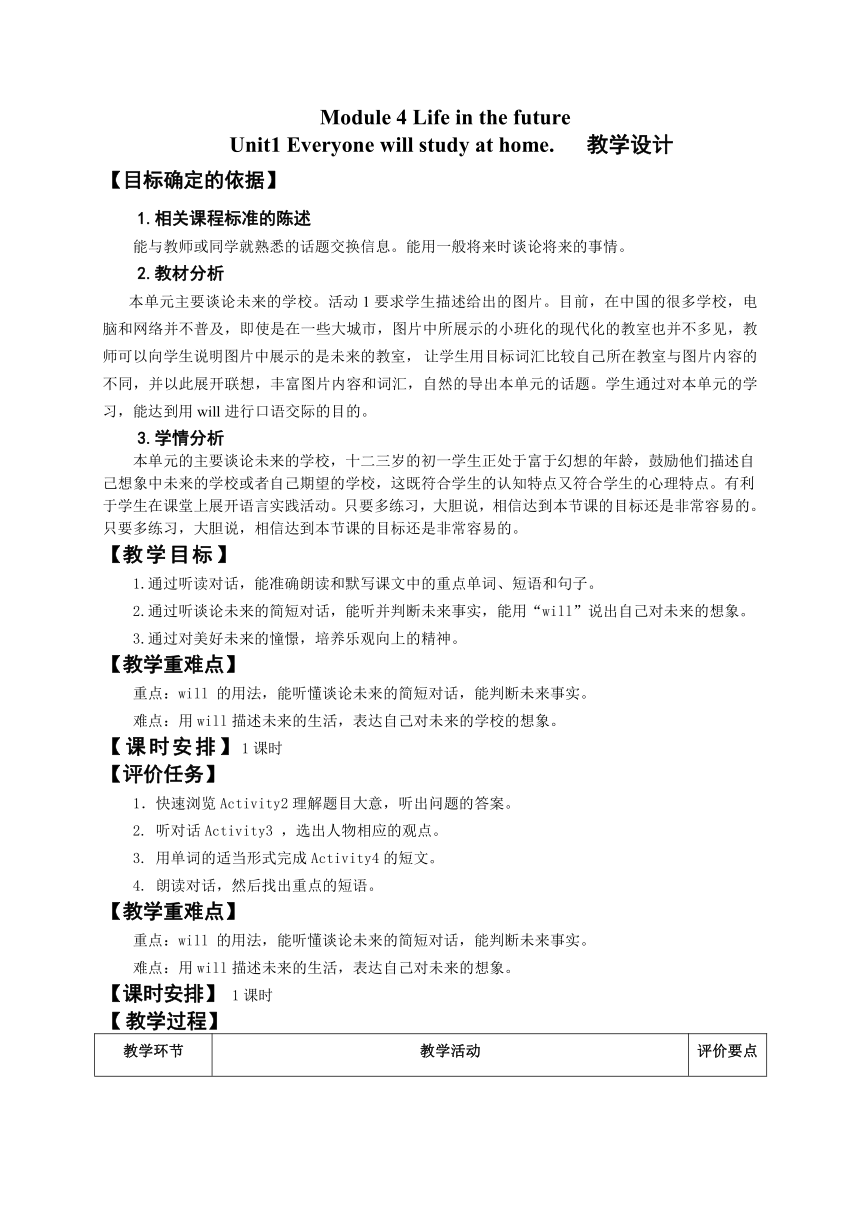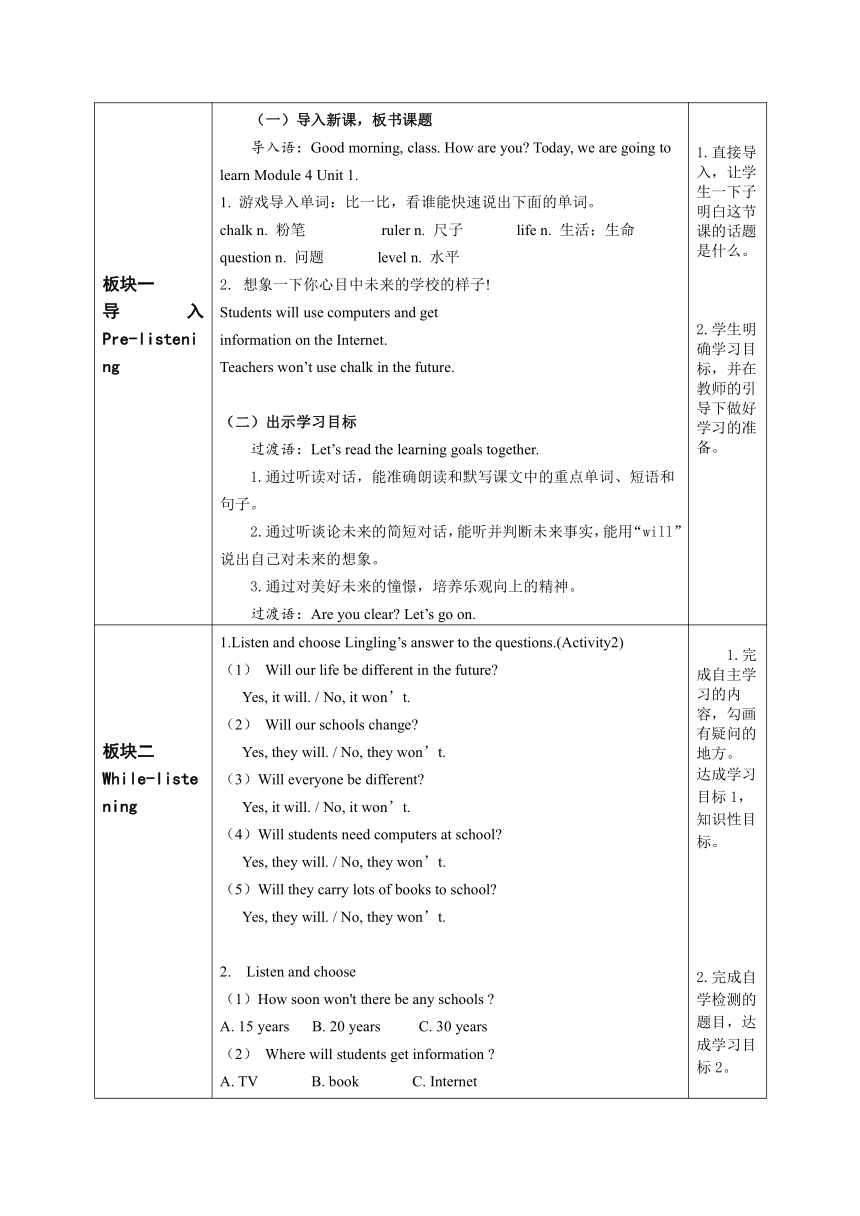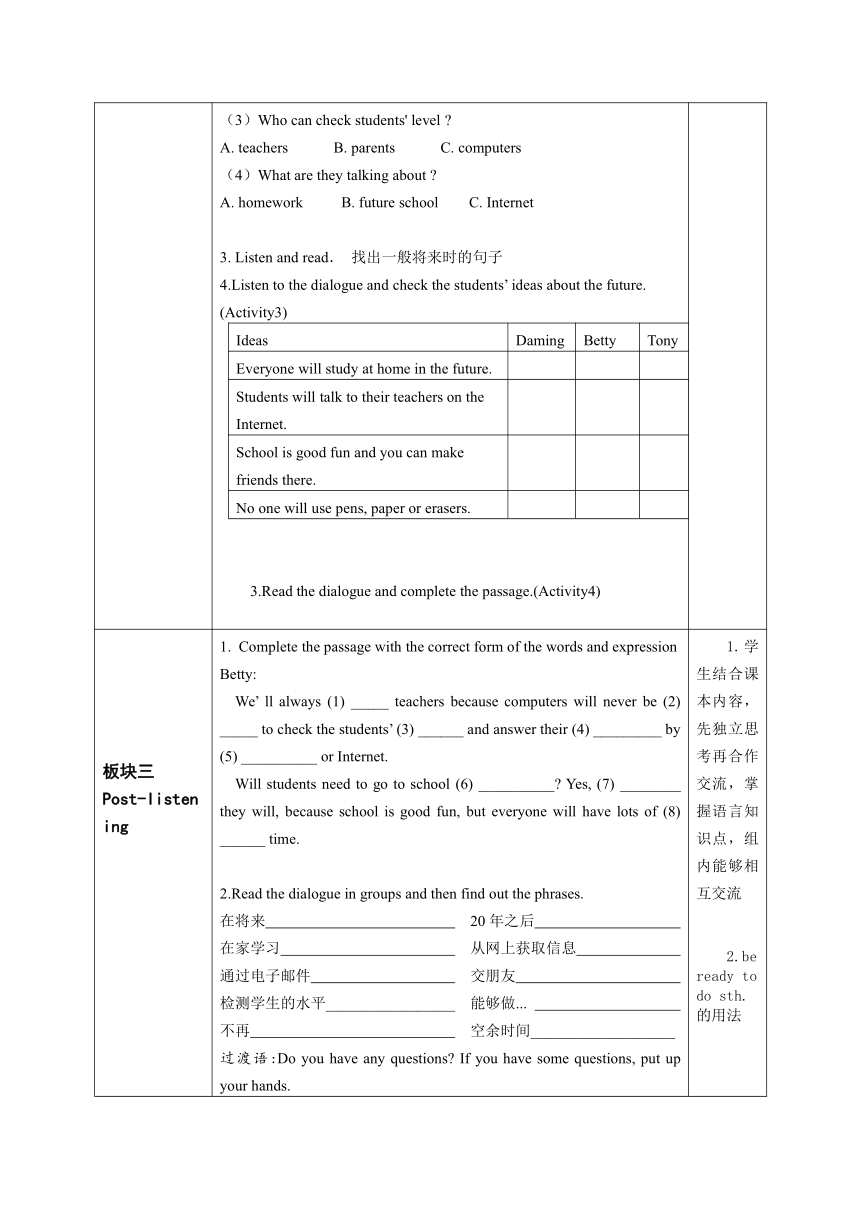Module 4 Life in the future Unit 1教案 (表格式)
文档属性
| 名称 | Module 4 Life in the future Unit 1教案 (表格式) |

|
|
| 格式 | docx | ||
| 文件大小 | 29.8KB | ||
| 资源类型 | 教案 | ||
| 版本资源 | 外研版 | ||
| 科目 | 英语 | ||
| 更新时间 | 2023-03-28 00:00:00 | ||
图片预览



文档简介
Module 4 Life in the future
Unit1 Everyone will study at home. 教学设计
【目标确定的依据】
1.相关课程标准的陈述
能与教师或同学就熟悉的话题交换信息。能用一般将来时谈论将来的事情。
教材分析
本单元主要谈论未来的学校。活动1要求学生描述给出的图片。目前,在中国的很多学校,电脑和网络并不普及,即使是在一些大城市,图片中所展示的小班化的现代化的教室也并不多见,教师可以向学生说明图片中展示的是未来的教室, 让学生用目标词汇比较自己所在教室与图片内容的不同,并以此展开联想,丰富图片内容和词汇,自然的导出本单元的话题。学生通过对本单元的学习,能达到用will进行口语交际的目的。
3.学情分析
本单元的主要谈论未来的学校,十二三岁的初一学生正处于富于幻想的年龄,鼓励他们描述自己想象中未来的学校或者自己期望的学校,这既符合学生的认知特点又符合学生的心理特点。有利于学生在课堂上展开语言实践活动。只要多练习,大胆说,相信达到本节课的目标还是非常容易的。只要多练习,大胆说,相信达到本节课的目标还是非常容易的。
【教学目标】
1.通过听读对话,能准确朗读和默写课文中的重点单词、短语和句子。
2.通过听谈论未来的简短对话,能听并判断未来事实,能用“will”说出自己对未来的想象。
3.通过对美好未来的憧憬,培养乐观向上的精神。
【教学重难点】
重点:will 的用法,能听懂谈论未来的简短对话,能判断未来事实。
难点:用will描述未来的生活,表达自己对未来的学校的想象。
【课时安排】1课时
【评价任务】
1.快速浏览Activity2理解题目大意,听出问题的答案。
2. 听对话Activity3 ,选出人物相应的观点。
3. 用单词的适当形式完成Activity4的短文。
4. 朗读对话,然后找出重点的短语。
【教学重难点】
重点:will 的用法,能听懂谈论未来的简短对话,能判断未来事实。
难点:用will描述未来的生活,表达自己对未来的想象。
【课时安排】 1课时
【教学过程】
教学环节 教学活动 评价要点
板块一 导入Pre-listening (一)导入新课,板书课题 导入语:Good morning, class. How are you Today, we are going to learn Module 4 Unit 1. 游戏导入单词:比一比,看谁能快速说出下面的单词。 chalk n. 粉笔 ruler n. 尺子 life n. 生活;生命 question n. 问题 level n. 水平 想象一下你心目中未来的学校的样子! Students will use computers and get information on the Internet. Teachers won’t use chalk in the future. (二)出示学习目标 过渡语:Let’s read the learning goals together. 1.通过听读对话,能准确朗读和默写课文中的重点单词、短语和句子。 2.通过听谈论未来的简短对话,能听并判断未来事实,能用“will”说出自己对未来的想象。 3.通过对美好未来的憧憬,培养乐观向上的精神。 过渡语:Are you clear Let’s go on. 1.直接导入,让学生一下子明白这节课的话题是什么。 2.学生明确学习目标,并在教师的引导下做好学习的准备。
板块二 While-listening 1.Listen and choose Lingling’s answer to the questions.(Activity2) (1) Will our life be different in the future Yes, it will. / No, it won’t. (2) Will our schools change Yes, they will. / No, they won’t. (3)Will everyone be different Yes, it will. / No, it won’t. (4)Will students need computers at school Yes, they will. / No, they won’t. (5)Will they carry lots of books to school Yes, they will. / No, they won’t. 2. Listen and choose (1)How soon won't there be any schools A. 15 years B. 20 years C. 30 years (2) Where will students get information A. TV B. book C. Internet (3)Who can check students' level A. teachers B. parents C. computers (4)What are they talking about A. homework B. future school C. Internet 3. Listen and read. 找出一般将来时的句子 4.Listen to the dialogue and check the students’ ideas about the future. (Activity3) IdeasDaming BettyTonyEveryone will study at home in the future.Students will talk to their teachers on the Internet.School is good fun and you can make friends there.No one will use pens, paper or erasers.
3.Read the dialogue and complete the passage.(Activity4) 1.完成自主学习的内容,勾画有疑问的地方。 达成学习目标1,知识性目标。 2.完成自学检测的题目,达成学习目标2。
板块三 Post-listening Complete the passage with the correct form of the words and expression Betty: We’ ll always (1) _____ teachers because computers will never be (2) _____ to check the students’ (3) ______ and answer their (4) _________ by (5) __________ or Internet. Will students need to go to school (6) __________ Yes, (7) ________ they will, because school is good fun, but everyone will have lots of (8) ______ time. 2.Read the dialogue in groups and then find out the phrases. 在将来 20年之后 在家学习 从网上获取信息 通过电子邮件 交朋友 检测学生的水平_________________ 能够做... 不再 空余时间___________________ 过渡语:Do you have any questions If you have some questions, put up your hands. 1.学生结合课本内容,先独立思考再合作交流,掌握语言知识点,组内能够相互交流 2.be ready to do sth.的用法
板块四Language points and grammar 过渡语:Next, work in groups to discuss the important language points。 学法指导:先结合例句独立思考,然后在小组长的带领下探究本课的知识点,不明白的作出标记,然后提交班内解决。 1.描述未来的事情需要用到__________时态,用__________________来构成。 否定句:__________________________一般疑问句:______________________________ 如:Everyone will study at home.每个人将会在家学习。 There won’t be any schools. 将不会再有学校。 他明天回来。________________________ In 20 years’ time, maybe there won’t be any schools. “in+一段时间”表示 ___________,常用于________时态,用_____________来提问。 他两天后举办生日聚会。______________________________________ there be 句型的一般将来时为____________,意为_________, 下周将会有一场足球比赛_______________________ _____________________________ be going to 也可用于there be 句型中,结构为______________________ 下个月将会有学校郊游。________________________ ____________________________ They can ask their teachers questions by Internet, telephone or email.他们可以通过网络,电话或是电子邮件问老师问题。 介词by表示方法、方式, 意思是“用...通过……,靠……”。 by后面直接跟单数名词, 且不加冠词 如:我每天骑自行车去上学。__________________________________________ Computers won’t be able to do that.计算机无法胜任。be able to 意为___________,相当于______,但是be able to可以用于更多的时态之中,如:I’m able to swim. = I can swim. 我会游泳。 They will be able to tell you the news soon.她们很快就能告诉你这个消息了。 Teachers won’t use chalk on a blackboard and students won’t use pens and paper, or erasers any more!老师们将不再用粉笔在黑板上写字,学生们也将不再使用钢笔、纸或橡皮! not…any more的意思是_______,相当于__________,指某动作不再重复发生,如: 她不再是小孩子了。____________________________ _______________________________ 我再也不那样做了。____________________________ _______________________________ 点拨语: not…any more的意思是不再,相当于no more,指某动作不再重复发生,如: She isn't a child any more. She is no more a child. I won't do that any more. I will do that no more. 1.选择填空 (1)There ________ a dolphin show in the zoo tomorrow evening.
A. was B. is going to have C. will have D. is going to be (2) –________ you ________ free tomorrow – No. I ________ free the day after tomorrow. A.Are; going to; will B. Are; going to be; will C. Are; going to; will be D. Are; going to be; will be
(3)Mother ____ me a nice present on my next birthday . A. will gives B. will give C. gives D. give (4) – Shall I buy a cup of tea for you –________. (不,不要) A. No, you won’t B. No, you aren’t. C. No, please don’t D. No, please. 2.根据汉语提示完成句子,每空一词。 (1) 你不再是一个孩子了。You ______ a child _____ _____. (2) 将来我想成为一名优秀的英语教师。I want to be a good English teacher ____ ____ ____. (3) 赵军能在一个新地方很快地交上朋友。Zhao Jun can ______ ______ quickly in a new place. (4)这台新电脑将能为我做许多事情This new computer will __ ____ __ do many things for me. 。 1.背诵本单元重点句子。 2.在真实的语境中感知目标语言的用法。
课堂小结:Ok!Let’s make a summary. What have you learnt in this class Think about the difficulties in this lesson. Class is over. 本节课的学习中,你收获了什么?哪些是你在检测训练过程中容易出错的?请认真归纳总结。 梳理自己的收获,反思自己的不足
附:板书设计
Module4 Unit1 Everyone will study at home.
in twenty years’ time
in the future
【教学反思】
Unit1 Everyone will study at home. 教学设计
【目标确定的依据】
1.相关课程标准的陈述
能与教师或同学就熟悉的话题交换信息。能用一般将来时谈论将来的事情。
教材分析
本单元主要谈论未来的学校。活动1要求学生描述给出的图片。目前,在中国的很多学校,电脑和网络并不普及,即使是在一些大城市,图片中所展示的小班化的现代化的教室也并不多见,教师可以向学生说明图片中展示的是未来的教室, 让学生用目标词汇比较自己所在教室与图片内容的不同,并以此展开联想,丰富图片内容和词汇,自然的导出本单元的话题。学生通过对本单元的学习,能达到用will进行口语交际的目的。
3.学情分析
本单元的主要谈论未来的学校,十二三岁的初一学生正处于富于幻想的年龄,鼓励他们描述自己想象中未来的学校或者自己期望的学校,这既符合学生的认知特点又符合学生的心理特点。有利于学生在课堂上展开语言实践活动。只要多练习,大胆说,相信达到本节课的目标还是非常容易的。只要多练习,大胆说,相信达到本节课的目标还是非常容易的。
【教学目标】
1.通过听读对话,能准确朗读和默写课文中的重点单词、短语和句子。
2.通过听谈论未来的简短对话,能听并判断未来事实,能用“will”说出自己对未来的想象。
3.通过对美好未来的憧憬,培养乐观向上的精神。
【教学重难点】
重点:will 的用法,能听懂谈论未来的简短对话,能判断未来事实。
难点:用will描述未来的生活,表达自己对未来的学校的想象。
【课时安排】1课时
【评价任务】
1.快速浏览Activity2理解题目大意,听出问题的答案。
2. 听对话Activity3 ,选出人物相应的观点。
3. 用单词的适当形式完成Activity4的短文。
4. 朗读对话,然后找出重点的短语。
【教学重难点】
重点:will 的用法,能听懂谈论未来的简短对话,能判断未来事实。
难点:用will描述未来的生活,表达自己对未来的想象。
【课时安排】 1课时
【教学过程】
教学环节 教学活动 评价要点
板块一 导入Pre-listening (一)导入新课,板书课题 导入语:Good morning, class. How are you Today, we are going to learn Module 4 Unit 1. 游戏导入单词:比一比,看谁能快速说出下面的单词。 chalk n. 粉笔 ruler n. 尺子 life n. 生活;生命 question n. 问题 level n. 水平 想象一下你心目中未来的学校的样子! Students will use computers and get information on the Internet. Teachers won’t use chalk in the future. (二)出示学习目标 过渡语:Let’s read the learning goals together. 1.通过听读对话,能准确朗读和默写课文中的重点单词、短语和句子。 2.通过听谈论未来的简短对话,能听并判断未来事实,能用“will”说出自己对未来的想象。 3.通过对美好未来的憧憬,培养乐观向上的精神。 过渡语:Are you clear Let’s go on. 1.直接导入,让学生一下子明白这节课的话题是什么。 2.学生明确学习目标,并在教师的引导下做好学习的准备。
板块二 While-listening 1.Listen and choose Lingling’s answer to the questions.(Activity2) (1) Will our life be different in the future Yes, it will. / No, it won’t. (2) Will our schools change Yes, they will. / No, they won’t. (3)Will everyone be different Yes, it will. / No, it won’t. (4)Will students need computers at school Yes, they will. / No, they won’t. (5)Will they carry lots of books to school Yes, they will. / No, they won’t. 2. Listen and choose (1)How soon won't there be any schools A. 15 years B. 20 years C. 30 years (2) Where will students get information A. TV B. book C. Internet (3)Who can check students' level A. teachers B. parents C. computers (4)What are they talking about A. homework B. future school C. Internet 3. Listen and read. 找出一般将来时的句子 4.Listen to the dialogue and check the students’ ideas about the future. (Activity3) IdeasDaming BettyTonyEveryone will study at home in the future.Students will talk to their teachers on the Internet.School is good fun and you can make friends there.No one will use pens, paper or erasers.
3.Read the dialogue and complete the passage.(Activity4) 1.完成自主学习的内容,勾画有疑问的地方。 达成学习目标1,知识性目标。 2.完成自学检测的题目,达成学习目标2。
板块三 Post-listening Complete the passage with the correct form of the words and expression Betty: We’ ll always (1) _____ teachers because computers will never be (2) _____ to check the students’ (3) ______ and answer their (4) _________ by (5) __________ or Internet. Will students need to go to school (6) __________ Yes, (7) ________ they will, because school is good fun, but everyone will have lots of (8) ______ time. 2.Read the dialogue in groups and then find out the phrases. 在将来 20年之后 在家学习 从网上获取信息 通过电子邮件 交朋友 检测学生的水平_________________ 能够做... 不再 空余时间___________________ 过渡语:Do you have any questions If you have some questions, put up your hands. 1.学生结合课本内容,先独立思考再合作交流,掌握语言知识点,组内能够相互交流 2.be ready to do sth.的用法
板块四Language points and grammar 过渡语:Next, work in groups to discuss the important language points。 学法指导:先结合例句独立思考,然后在小组长的带领下探究本课的知识点,不明白的作出标记,然后提交班内解决。 1.描述未来的事情需要用到__________时态,用__________________来构成。 否定句:__________________________一般疑问句:______________________________ 如:Everyone will study at home.每个人将会在家学习。 There won’t be any schools. 将不会再有学校。 他明天回来。________________________ In 20 years’ time, maybe there won’t be any schools. “in+一段时间”表示 ___________,常用于________时态,用_____________来提问。 他两天后举办生日聚会。______________________________________ there be 句型的一般将来时为____________,意为_________, 下周将会有一场足球比赛_______________________ _____________________________ be going to 也可用于there be 句型中,结构为______________________ 下个月将会有学校郊游。________________________ ____________________________ They can ask their teachers questions by Internet, telephone or email.他们可以通过网络,电话或是电子邮件问老师问题。 介词by表示方法、方式, 意思是“用...通过……,靠……”。 by后面直接跟单数名词, 且不加冠词 如:我每天骑自行车去上学。__________________________________________ Computers won’t be able to do that.计算机无法胜任。be able to 意为___________,相当于______,但是be able to可以用于更多的时态之中,如:I’m able to swim. = I can swim. 我会游泳。 They will be able to tell you the news soon.她们很快就能告诉你这个消息了。 Teachers won’t use chalk on a blackboard and students won’t use pens and paper, or erasers any more!老师们将不再用粉笔在黑板上写字,学生们也将不再使用钢笔、纸或橡皮! not…any more的意思是_______,相当于__________,指某动作不再重复发生,如: 她不再是小孩子了。____________________________ _______________________________ 我再也不那样做了。____________________________ _______________________________ 点拨语: not…any more的意思是不再,相当于no more,指某动作不再重复发生,如: She isn't a child any more. She is no more a child. I won't do that any more. I will do that no more. 1.选择填空 (1)There ________ a dolphin show in the zoo tomorrow evening.
A. was B. is going to have C. will have D. is going to be (2) –________ you ________ free tomorrow – No. I ________ free the day after tomorrow. A.Are; going to; will B. Are; going to be; will C. Are; going to; will be D. Are; going to be; will be
(3)Mother ____ me a nice present on my next birthday . A. will gives B. will give C. gives D. give (4) – Shall I buy a cup of tea for you –________. (不,不要) A. No, you won’t B. No, you aren’t. C. No, please don’t D. No, please. 2.根据汉语提示完成句子,每空一词。 (1) 你不再是一个孩子了。You ______ a child _____ _____. (2) 将来我想成为一名优秀的英语教师。I want to be a good English teacher ____ ____ ____. (3) 赵军能在一个新地方很快地交上朋友。Zhao Jun can ______ ______ quickly in a new place. (4)这台新电脑将能为我做许多事情This new computer will __ ____ __ do many things for me. 。 1.背诵本单元重点句子。 2.在真实的语境中感知目标语言的用法。
课堂小结:Ok!Let’s make a summary. What have you learnt in this class Think about the difficulties in this lesson. Class is over. 本节课的学习中,你收获了什么?哪些是你在检测训练过程中容易出错的?请认真归纳总结。 梳理自己的收获,反思自己的不足
附:板书设计
Module4 Unit1 Everyone will study at home.
in twenty years’ time
in the future
【教学反思】
同课章节目录
- Module 1 Lost and found
- Unit 1 Whose bag is this?
- Unit 2 Are they yours?
- Unit 3 Language in use
- Module 2 What can you do ?
- Unit 1 I can play the piano
- Unit 2 I can run really fast
- Unit 3 Language in use
- Module 3 Making plans
- Unit 1 What are you going to do at the weekends?
- Unit 2 We're going to cheer the players.
- Unit 3 Language in use
- Module 4 Life in the future
- Unit 1 Everyone will study at home
- Unit 2 Every family will have a small plane.
- Unit 3 Language in use
- Module 5 Shopping
- Unit 1 What can I do for you?
- Unit 2 You can buy everything on the Internet
- Unit 3 Language in use
- Module 6 Around town
- Unit 1 Could you tell me how to get to the Nationa
- Unit 2 The London Eye is on your right.
- Unit 3 Language in use
- Revision module A
- Module 7 My past life
- Unit 1 I was born in a small village.
- Unit 2 I was born in Quincy.
- Unit 3 Language in use
- Module 8 Story time
- Unit 1 Once upon a time….
- Unit 2 Goldilocks hurried out of the house.
- Unit 3 Language in use
- Module 9 Life history
- Unit 1 He left school and began work at the age of
- Unit 2 He decided to be an actor.
- Unit 3 Language in use
- Module 10 A holiday journey
- Unit 1 What did you do?
- Unit 2 This morning we took a walk.
- Unit 3 Language in use
- Module 11 Body language
- Unit 1 They touch noses!
- Unit 2 Here are some ways to welcome them.
- Unit 3 Language in use
- Module 12 Western music
- Unit 1 It's so beautiful!
- Unit 2 Vienna is the centre of European classical
- Unit 3 Language in use
- Revision module B
